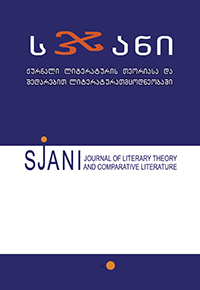ეპიდემია ქართულ პროზასა და კინემატოგრაფში: დავით კლდიაშვილისა და ვაჟა-ფშაველას მოთხრობების ეკრანიზაციები
Epidemic in Georgian Prose and Cinema: Film Versions of Stories by David Kldiashvili and Vazha-Pshavela
Author(s): Lela TsiphuriaSubject(s): Language and Literature Studies, Film / Cinema / Cinematography, Georgian literature
Published by: ლიტერატურის ინსტიტუტის გამომცემლობა
Keywords: Georgian prose; Georgian film; intermediality; interpretation; epidemic;
Summary/Abstract: The paper discusses the changes and the forms of adaptation of the literary text suggested by the filmmaker. Two texts chosen for the analysis are related to the Georgian experience of the epidemic, depicted from two different perspectives: Miqela (1904) by David Kldiashvili and Cholera Saved Me (1892) by Vazha-Pshavela. Kldiashvili’s short story served as a basis for the film Miqela (1964) adapted and directed by Eldar Shengelaia; while the plot of Vazha-Pshavela’s short story was used by the scriptwriter and film director Pavle Charkviani in his film Some Troubles Are Helpful (1984). The paper deals with the issue of turning literary texts into works of synthetic art, which is essentially related to intermediality. The interpretation of prose within film/audiovisual art is one of the topics interrelating literary studies and film studies. Georgian cinema and the world cinematograph are known for a large share of screenings among samples, which provides rich material suitable for the discussion. While the prose texts by Georgian writers are interpreted within audiovisual art, the verbal representative system of the literary primary source is transformed into the language of audiovisual art. The constituent parts of the literary texts - the characters, and dialogues – are transformed into audio text. David Kldiashvili’s short story is one of the most dramatic among his works, depicting the life of the elderly man, Miqela, who is left hopeless against the epidemic. His naive understanding of Christian religious views on death and eternity makes his belief system primitive and, eventually, merciless to his grandson. His prejudices define the superstitions of the elderly man and his fellow villagers, popular ideas about life and death influence their decisions and actions. In the short story, the Orthodox priest tries to explain to Miqela, how ungrounded superstitions are his ideas and fears about misfortune, and how unacceptable are they in modern times. However, Miqela's thoughts are dominated by the feeling of obedience to the ‘deity’, although his and his fellow villagers' ideas about ‘deity’ are far away from the subjects of Christian teaching. The early 1960s, when the film was directed by Eldar Shengelaia, were declared by the Soviet propaganda as the years of construction of ‘Great Communism’. The end of the period of totalitarianism was more than ten years behind, the process of de-Stalinization is still ongoing, but the Russian centre still required adherence to communist principles: religion, faith, church, priest – could be represented only in a negative context. The characters of the priests in Georgian films are shown in adverse or just comic light. The story about the superstition described by Davit Kldiashvili, a classic writer, was the best material for the consequent film of Soviet times to depict the ‘darkness’ of the past. In general, Georgian arts and cinema of the 1960s fully shared this pathos, and many films of the period had a critical view of the past. Eldar Shengelaya's Miqela, with its pathos of whistleblowers of superstition, is opposing the pathos David Kldiashvili’s works, where the warmth, love and compassion towards his own characters prevail. At the same time, Eldar Shengelaya’s film Mikela is the first attempt to represent the psychological aspect of Davit Kldiashvili's work. Vazha-Pshavela’s short story Cholera Saved Me was written in 1892 when the cholera epidemic spread all over the Russian Empire. At that time, the genius writer himself had recently suffered from anthrax, which damaged his right eye, and his health deteriorated. Against this background, the story written about cholera is surprisingly optimistic. In the short story, fear gives courage to the young couple and surpasses happiness, while the people of the mountain village flee to the forest from the impending epidemic. Pavle Charkviani filmed Some Troubles are Helpful in 1984. The script for the film was based on Vazha-Pshavela's short stories Cholera Saved Me, Darejani and A Picture of the Pshav’s Life. Two different visions of the epidemic, and different plots: Miqela turned into a monster due to the depression caused by time; on the other hand, the beautiful young couple find happiness regardless of the time. While facing death from the spreading disease, different approaches are seen in literary texts and films: the pessimism in David Kldiasvili’s/Eldar Shengelayas’s works gives rise to cruelty and even crime; while the optimism in Vazha-Pshavela’s/Pavle Charkviani’s works leads to fulfilment and happiness. Screenings of Georgian prose played an important role in forming the phenomenon of Georgian cinema. The authority of great writers and the legitimacy of literary material allowed film directors to understand not only the past but also the present. The theme of the epidemic, which was considered a part of the past during the creation of the screenplays, no longer occupied a central place in the films. Instead, the film directors follow the writers' ideas and understand the film's problems in a moral dimension. The lessons given by literature and film was supportive for Georgian audiences in the troubled situation caused by the world pandemic of the 2020s. Where will this experience lead us, what path will the world choose, and in what form will the pandemic become a source of inspiration for writers and directors – these questions still have to be answered.
Journal: სჯანი
- Issue Year: 2024
- Issue No: 25
- Page Range: 296-308
- Page Count: 13
- Language: Georgian

